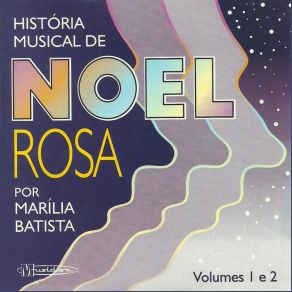História Musical de Noel Rosa / Historia Musical de Noel Rosa
Download links and information about História Musical de Noel Rosa / Historia Musical de Noel Rosa by Marília Batista / Marilia Batista. This album was released in 1996 and it belongs to World Music, Latin genres. It contains 12 tracks with total duration of 01:31:02 minutes.

|
|
|---|---|
| Artist: | Marília Batista / Marilia Batista |
| Release date: | 1996 |
| Genre: | World Music, Latin |
| Tracks: | 12 |
| Duration: | 01:31:02 |
| Buy it NOW at: | |
| Buy on iTunes $11.88 | |
Tracks
[Edit]| No. | Title | Length |
|---|---|---|
| 1. | Prá Que Mentir / Feitio de Oração / Só Pode Ser Você / Silêncio de um Minuto / Voltaste | 7:51 |
| 2. | Vai Haver Barulho No Chateau / Onde Está a Honestidade / Você Vai Se Quiser / Vitória / Eu Vou Prá Vila | 7:00 |
| 3. | Cordiais Saudações / Positivismo / O Maior Castigo Que Eu Te Dou / Riso de Criança / Para Me Livrar do Mal | 7:46 |
| 4. | Rapaz Folgado / Coração / Quando o Samba Acabou / Prazer Em Conhece-lo / Pela Decima Vez | 7:41 |
| 5. | Século do Progresso / Dama do Cabaret / Três Apitos / Esquina da Vida / X do Problema | 8:43 |
| 6. | Eu Sei Sofrer / Filosofia / Pela Primeira Vez / Fita Amarela / O Orvalho Vem Caindo | 6:24 |
| 7. | Coisas Nossas / Gago Apaixonado / Julieta / Não Tem Tradução / Amor de Parceria | 7:12 |
| 8. | João Ninguem / Último Desejo / Poema Popular / Para Esquecer / Cor de Cinza | 7:58 |
| 9. | Tarzan (O Filho do Alfaiate) / Conversa de Botequiim / De Babado / Com Que Roupa / Até Amanhã | 7:05 |
| 10. | Verdade Duvidosa / Para Atender a Pedido / Meu Barracão / Cara Ou Coroa (Vai P'ra Casa) / Mentir | 9:08 |
| 11. | Feitiço da Vila / Palpite Feliz / Provei / Quem Ri Melhor / Quantos Beijos | 6:33 |
| 12. | Cidade Mulher / Você por Exemplo / Pierrot Apaixonado / A-e-i-o-u / Pastorinhas | 7:41 |
Details
[Edit]Marília Batista disputes with Aracy de Almeida (still after the death of both) the title of best interpreter for Noel Rosa's compositions. Rosa declared that Batista was the one. Until the most complete compilation of Noel Rosa's works (fruit of Professor Omar Jubran's research, bringing 228 compositions of a total of 259) comes out, this is the most comprehensible collection of Rosa's tunes. Batista is a good singer anyway. Her voice was taken from her old 78 rpms and received an orchestral dressing, signed by one of the most important composers/orchestrators of Brazilian erudite/popular music, maestro Guerra Peixe. Maybe the thing that first captures the imagination is a heavily syncopated violão, which could only exist after bossa nova. The orchestration, nevertheless, remain faithful to those times' usage, even if always carrying the mark of a vanguard arranger. But some may prefer to listen to Rosa with a regional (the traditional accompanying group, with violão, seven-string violão, cavaquinho, and pandeiro) backing. The booklet has a good deal of information (in Portuguese) about the historic facts surrounding the Rosa/Batista association, but makes no mention about the year of the release or the history of this recreation for that matter. This double-CD reissue has 60 of Rosa's compositions, with several medleys devised to cope with the challenge of covering such number of songs in only two discs.